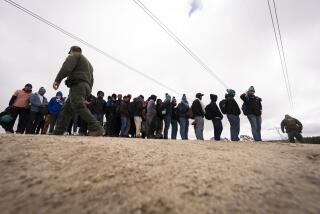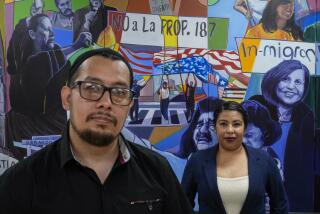Iraqis rethink American dream
BAGHDAD -- Raheem’s cellphone rang as we walked through a crowded market, stepping over piles of trash and weaving around slow-moving donkey carts.
He spoke to the caller in his usual low murmur, then hung up. It was a U.S. immigration official, he told me. His application for refugee status in America had been approved. The flight was nine days away. “What do you think?” he asked, as calmly as if inviting my opinion on a new shirt.
But Raheem, who speaks English with poetic fluency and carries himself with the dignity of an Ivy League lecturer, already knew he would not go.
In Iraq, he owns property and has a job, and his son has a promising career in computer technology. Bombs, of course, still go off and gunfire still crackles in the streets. Neighborhood gossip is of sectarian killings and kidnappings. But the epidemic of bloodshed seems a thing of the past.
The local news, meanwhile, reports on America’s economic woes, of foreclosed homes being auctioned off for a pittance. Word filters back from Iraqis in the U.S. who are unable to find work, struggling to afford medical care, and devouring savings that once seemed everlasting.
“It used to be that going to America was a dream. No more,” said Raheem, 56, a former teacher and experienced reporter who is one of the local cast of journalists, interpreters, drivers, guards, technicians and general fix-it men and women who have kept The Times running here since the war began.
The idea of going to the United States has long been a topic of discussion among Iraqis who have worked with Americans here in aid agencies, news organizations and the U.S. military. Their jobs make them susceptible to attacks by insurgents who have taken aim at U.S.-associated institutions and their most vulnerable employees: the Iraqis who come to work for them each day.
Now the economic aspect invariably creeps into the conversation. One rumor making the rounds is that things in the United States are so bad, new refugees could be sent to Guam.
“Life here has been difficult. We did not arrive at the perfect time,” one former Times staffer wrote last month from his new home on the icy East Coast.
Raheem and I have had countless conversations on this topic since last summer, after the Refugee Crisis in Iraq Act made it possible for Iraqis who worked for U.S.-based media, aid agencies and the U.S. government and its contractors to receive special consideration as refugees.
Among Iraqi media workers, the first applications under the act were filed in May. A U.S. Embassy official said the number of people applying isn’t disclosed, only how many Iraqis have been resettled in the United States. So far 4,409 Iraqis, including those applying under the act, have been resettled this fiscal year, which began Oct. 1.
By the time most applicants had gone through the requisite Department of Homeland Security checks, interviews and medical exams, the U.S. stock market had begun to tank. Iraq’s government, meanwhile, had begun making life here more attractive by giving pay raises to civil servants, many of whom juggle their state jobs with work for American news and nongovernmental organizations.
Even with unemployment in Iraq officially at 18% -- far higher than in America -- Iraqis are eligible for monthly food rations no matter what their income. In a society where bank loans and credit cards are virtually unheard of, most people own their homes outright. And many Iraqis are flush with cash after years of having little to spend money on.
As Iraqis’ earnings grew, the violence around them continued a steady drip downward. Stores, restaurants, parks and even nightclubs opened, taking the edge off the bullet-scarred landscape and relieving the suffocating boredom of the last few years, when curfews, bloodshed and religious extremism turned this once-lively society hermetic. On a recent weekend, Baghdad’s Zawra Park was packed with families, young couples and children, visiting the zoo, sitting on swing sets, spinning on amusement park rides.
What used to be a simple decision to stay or leave became far more difficult for many Iraqis, with families torn over the issue. One of our drivers, Ahmed, 44, an engineer by training, is determined to leave and expects to get the call within three months.
But his wife, after initially supporting the idea, has changed her mind. She will retire soon after 22 years as a teacher and wants to enjoy her comfortable pension in Iraq’s newly stable environment, not struggle to make her way in a new country, he explained one day as we maneuvered through choking traffic.
Ahmed is resigned to starting his new life alone. “I want a new identity,” he said.
A reporter, Usama, 34, is undecided. He fears being unable to support his wife and their two young children in the United States, but to leave them behind in hopes of one day bringing them over? “It’s a difficult equation. I’m hesitating,” he confessed recently, even though he has dreamed since childhood of going to America.
For Usama, awaiting the call is a much-needed stall. It gives him breathing space while he obsesses over the issue.
At least four staffers say they still want to leave, but at least three are on the fence about what to do when the call comes in. A year ago, that was unthinkable.
Most, but not all, applicants are accepted. Some have been turned down for reasons that never quite become clear, as was the case with Qusay, a Times driver who was so certain he would be leaving that he sold everything he owned. “My house is like a mosque,” he said recently, referring to its bare floors and lack of furnishings.
When Qusay, 34, got word in December of his rejection, he was distraught. In the nearly two years we had worked together, he had talked of his yearning to leave Baghdad, where he feared for his wife and children in their militia-plagued neighborhood.
But after listening to others, he says he won’t fight his rejection. Instead of lamenting his lack of furniture, he’s planning to buy new things. He just bought a new car and cheerfully shows off its spiffy feature: an engine that starts up with the flick of a switch when he’s outside the vehicle.
“I did the right thing by not going. Every day my wife tells me this,” he said with confidence, gripping the steering wheel and eyeing the traffic around us as the worry beads hanging from the rear-view mirror clacked against the windshield. His wife just got a job, bringing in a second income. His neighborhood has been cleared of the masked gunmen who once ruled the roads. Finally, the family is content.
It is a good thing that Qusay seems comfortable with staying put. Rarely do would-be Iraqi refugees get a second chance. Those who opt to stay will have to live with their decision, just as those who take the leap try to live with theirs.
“I am trying my best here and will see what will happen,” said the former staffer now living on the East Coast, who earns $10 an hour at a pharmacy. “To be honest . . . the option of returning is always open for me.”
More to Read
Sign up for Essential California
The most important California stories and recommendations in your inbox every morning.
You may occasionally receive promotional content from the Los Angeles Times.











